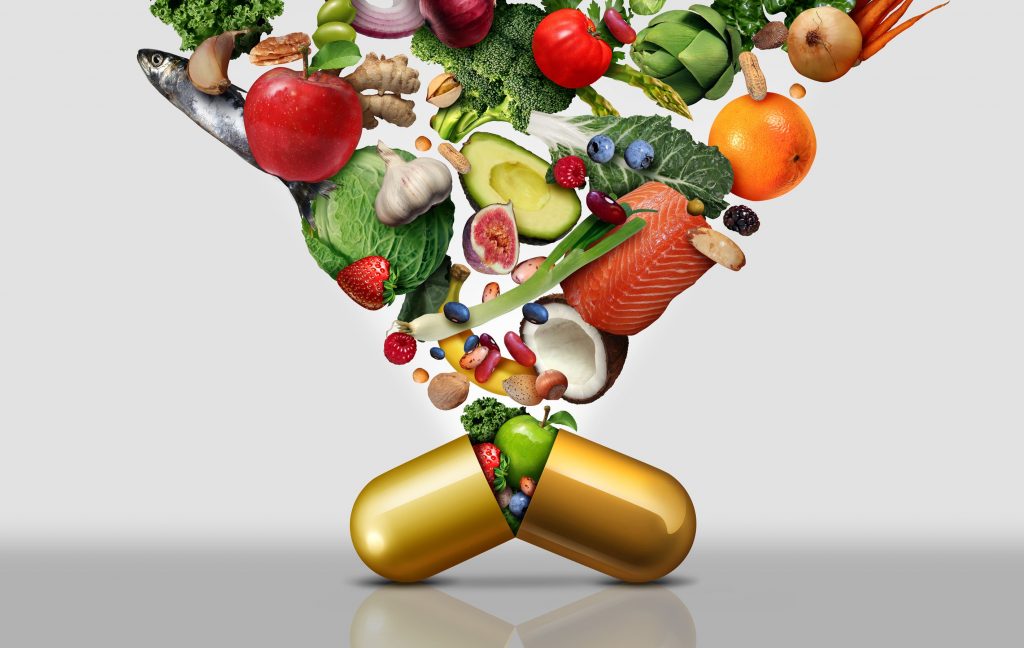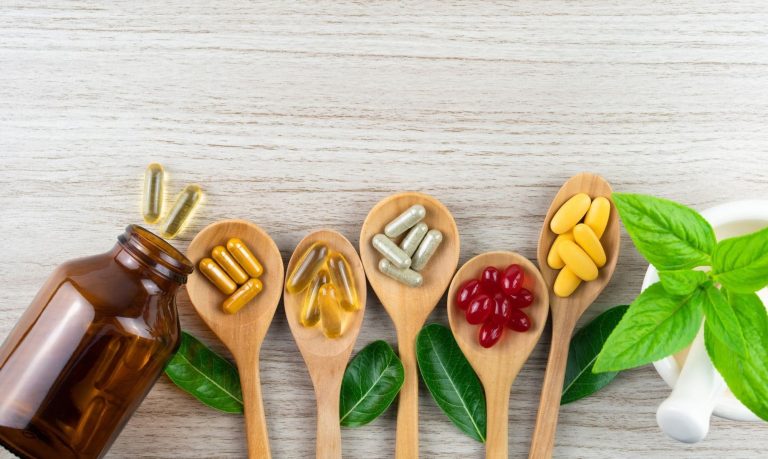As we age, our need for vitamins and minerals changes. This is particularly true for women entering menopause. When menstruation ends, the body undergoes significant hormonal changes that affect the functioning of every system: from the skin to the bones. In such cases, certain vitamins, minerals and other nutrients can limit the impact of menopause on health, reducing its unpleasant symptoms. Therefore, especially after the age of 50, it is worth taking care of a balanced diet and, if necessary, supplementing it.
Menopause – what is it?
All menstruating women will eventually experience menopause, also known as climacteric. Mature women who have not had a period for at least 12 months can expect menopause. It is difficult to confuse it with anything else, because in addition to the cessation of menstrual bleeding, there are also numerous symptoms of menopause. They usually start 5-6 years before the last period.
Unpleasant symptoms of menopause
Although menopause is a completely natural process in every woman’s life, its symptoms are definitely not pleasant. Women are primarily accompanied by hot flashes, night sweats and mood swings. Women may gain weight despite following the same diet as before. At the same time, their blood cholesterol levels increase. They often struggle with sleep disorders, for example, waking up at night or getting up early in the morning. The decrease in estrogen in the body contributes to skin changes or hair loss. It can also lead to a decrease in libido.
What is most effective for menopause?
Women experiencing the first symptoms of menopause should not underestimate their health. Women over fifty are primarily recommended to eat a varied diet that provides the body with the necessary vitamins, minerals and phytohormones. A woman’s diet during menopause should be rich in fresh vegetables and fruits, whole grains, low-fat dairy products, legumes, nuts and fish. A consultation visit to a gynecologist is also mandatory. It is best to do it as part of routine diagnostic tests. The doctor will conduct a thorough health interview and order additional tests for women during menopause. On this basis, he can recommend changes to your current lifestyle and the use of specific preparations to alleviate the troublesome symptoms of menopause.
What vitamins to take after the age of 50?

The types and doses of vitamins recommended for women over fifty differ slightly from those recommended for men. This is a direct result of menopause, which increases a woman’s body’s need for certain nutrients. Particularly important for women during menopause are:
- Vitamin A – contributes to the good condition of the skin and mucous membranes, which become thinner and more susceptible to drying during menopause. The daily requirement for vitamin A by a woman’s body is 700 mcg of this ingredient. Good sources of vitamin A are eggs, milk, liver, sweet potatoes and pumpkin.
- Vitamin C – a strong antioxidant counteracts free radicals responsible for cell aging in the body, supports the functioning of the immune system and stimulates the skin to regenerate faster. According to the Nutrition Standards, the daily requirement for vitamin C in women is 75 mg. . Large amounts of vitamin C can be supplied to the body by consuming red peppers, parsley or berries.
- Vitamin E – an ingredient also called the vitamin of youth has a positive effect on the condition of the skin, and also supports the proper functioning of the circulatory system and the nervous system. In older people, the recommended daily intake is 8 mg. Vitamin E is found in walnuts, almonds, pumpkin seeds, cabbage and spinach.
- B vitamins – especially vitamin B6, folic acid and vitamin B12 have a positive effect on the hormonal balance in a woman’s body. They support the body’s proper energy metabolism, which counteracts chronic fatigue and weariness. The demand for B vitamins varies depending on the specific ingredient. A good source of B vitamins are green leafy vegetables, legumes and bran.
- Vitamin D – due to Poland’s location on the world map, most women may have insufficient levels of it in their bodies. Meanwhile, vitamin D is very important for health, because it is involved in the absorption of calcium and phosphorus, and also supports the functioning of the nervous system. Additionally, it affects the proper functioning of the immune system. The recommended daily intake for women is 600 IU of vitamin D. It is mainly synthesized through skin exposure to the sun. It is also found in oily fish, eggs and offal.
- Calcium – due to the decrease in bone mineralization after menopause, women are advised to enrich their diet with calcium. Women over 50 should meet the recommended daily intake of 1200 mg. . Calcium also has a positive effect on the functioning of the cardiovascular system. A good source of calcium is sunflower seeds, tofu, sesame and nuts.
- Magnesium – there are many reasons why it is worth taking magnesium, but in the case of women during menopause, the indication for supplementation of this element is primarily its effect on the nervous system. Women can take 320 mg of magnesium per day. Magnesium is found in cocoa, nuts, groats and whole grain bread.
- Potassium – another mandatory component of the daily diet, which supports the functioning of the cardiovascular system of women after menopause. The daily requirement for potassium for a woman over fifty is 3500 mg. Sources of potassium include tomatoes, potatoes, legumes and bananas.
- Omega-3 fatty acids – contribute to the proper level of cholesterol in the body, supporting the health of the circulatory system. They also support proper cognitive functioning. The best sources of omega-4 acids are oily sea fish and vegetable oils (flaxseed, soybean and rapeseed).
Supplements for women during menopause
As can be seen from the above list, the set of vitamins for women during menopause is really large. For this reason, many women over fifty reach for multivitamins, which are much easier to dose. Thanks to them, you do not have to analyze every day which vitamins to take during menopause. One capsule, tablet or lozenge soluble in water significantly increases the comfort of any supplementation. Especially since the list of preparations that can be taken during menopause is not over yet.
Phytoestrogens
The significant decreases in estrogen levels in the body that accompany menopause may in some cases require hormone replacement therapy. However, not all women want to decide on this therapy or the problem is not as severe, but is still noticeable. In such a case, women may consider phytohormones. They are usually multi-ingredient preparations that contain plant extracts, including soy, red clover, linseed, grapes, sage, fenugreek and alfalfa. Flavanoids, lignans and stilbenes are characterized by a mild effect, which is felt with longer, systematic supplementation.
Dietary fiber
During menopause, women’s intestinal peristalsis may also change. To prevent constipation, flatulence and similar ailments, as well as to support the proper absorption of nutrients from your diet, women can also consider fiber supplementation. It has a positive effect on the beneficial bacterial flora of the digestive system.
Adaptogens
Another group of nutrients that support the proper functioning of a woman’s body during menopause can be adaptogens. Tonic plant extracts support maintaining its homeostasis. First of all, they have strong antioxidant properties, thanks to which they fight free radicals. They also support the nervous system, which is reflected in a more stable mood and peaceful sleep. Popular adaptogens include ginseng, ashwagandha, astragalus membranaceus, schisandra chinensis and MACA.
